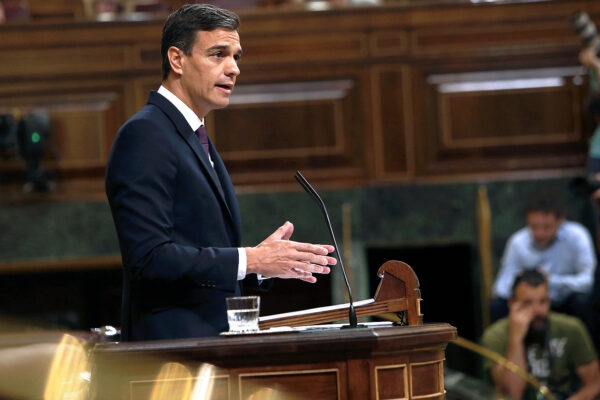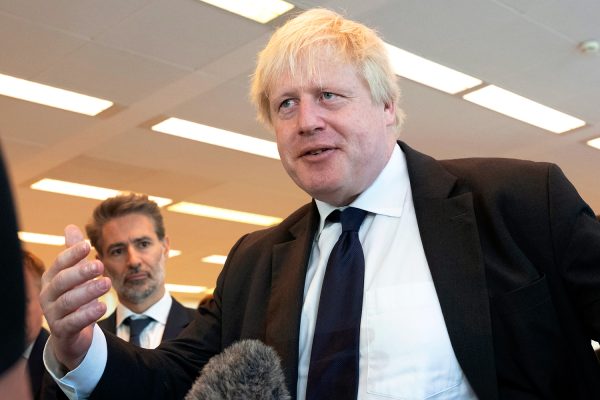As we close out 2019, the Atlantic Sentinel celebrates ten years online. For the new year, I have sharpened the site’s look, taking advantage of coding that is now supported by all major and recent browsers to create an even more fluid layout.
If I overlooked any formatting errors, please let me know!
Looking back on the year, it’s hard to escape the feeling that the center cannot hold — from a worsening separatist crisis in Catalonia to stagnation in Italy to political stalemate in Israel to political polarization in the United States.
Let’s hope 2020 gives us better news. Certainly the elections in America will keep us busy. Expect plenty of analysis and opinion from us about the Democratic primaries in the first half of the year and of the general election in the autumn.
But first, our best stories of 2019.
Sánchez Needs to Show Statesmanship in Catalonia

The Catalan independence crisis reached a new low this year. Nine separatist leaders, including seven former members of the Catalan regional government, were convicted to up to thirteen years in prison for organizing a failed independence push in 2017. Demonstrations for Catalan independence turned violent for the first time.
In the rest of Spain, anti-Catalan sentiment ran so high that Vox, a far-right, neo-Francoist party that wants to revoke Catalonia’s autonomy, got 15 percent of the votes, making it the third party of Spain.
Prime Minister Pedro Sánchez, whose Socialist Party is still the largest, needs to show statesmanship. The broad middle of Catalan society could still be satisfied with more self-government, ideally within the context of a federal Spain, but attitudes are hardening in the region. If the next Spanish government (Sánchez is trying to put together a left-wing coalition with Catalan support) doesn’t take command of events, extremists on either side will. Read more
Italy Is Failing Its Next Generation

Italy has gone through two governments this year, one supported by the far right, another propped up by the center-left. Neither has implemented the sort of reforms the country needs to save its lost generation.
Young Italians are the only Europeans who have less faith in the EU than their elders. It’s not hard to understand why. Nearly one in three of them are out of work. Of those in work, the majority are on temporary contracts. Italy spends less on higher education than its neighbors. Incomes in real terms have barely grown since 1995.
Populists of the left and right scapegoat the EU and immigration, but Italy’s slow growth, low productivity, high debts and poor education aren’t the fault of outsiders.
Italy’s root problems are low political accountability and a weak rule of law, which manifest themselves in clientelism and illegality. No politician or major party even talks about these problems, much less offers a solution. Read more
Happy Little Country

For a better-run country, look to the Netherlands. My home country is among the happiest in the world. They have the best health care system in Europe, the third lowest employment rate in the EU and more people in work than ever before. The immigration crisis has receded from the headlines. Support for anti-establishment parties is down. Trust in the political system is up. There is a growing consensus about what it means to be Dutch. Read more
Boris Johnson and the Brexit Ultras Deserve Each Other

The biggest Conservative majority in thirty years is an odd reward for a man who has been willing to betray anyone and anything to achieve his life’s ambition: to become prime minister. Inevitably, Boris Johnson will betray the Brexiteers who pinned their hopes on him.
They deserve each other. Brexit as an ideology — the idea that Britain will be better off outside the EU — was always a fantasy. Who better to carry it out than the biggest fantasist in British politics? Read more
Netanyahu’s Miscalculation

Israelis are due to return to the polls in the new year for the third time in eleven months. Prime Minister Benjamin Netanyahu twice called elections in 2019 in a bid to shore up his mandate and escape allegations of corruption. It backfired. Netanyahu managed to unite his opponents and was indicted for corruption anyway.
But Ariel Reichard cautions he is still the undisputed master of the Israeli right, which is the reason he still has a fighting chance. Read more
Macri’s Failure Returns Peronists to Power in Argentina

2019 saw a political upset in Argentina. Mauricio Macri was the country’s first center-right president in fifteen years, but he failed to win reelection in October.
Christian FitzHugh blames the conservative’s gradualist approach to reform, which convinced neither investors nor voters.
The question now is how the Peronists will cope with a worsening economic outlook, especially when they don’t a majority in Congress. Hopes are that Alberto Fernández will not rock the boat, but his vice president, and former president, Cristina Fernández de Kirchner, isn’t known for her pragmatism. Read more
Republicans Are Destroying Institutions to Save Their Party

The big story in American politics has been the debasement of the Republican Party to a would-be strongman, Donald Trump.
To defend him, and their short-term political interests, Republicans will stop at nothing. Having already undermined Americans’ trust in the media and universities, they now have the Justice Department, the FBI, the courts and arguably the Constitution in the sights.
This is a recipe for disaster. Read more
How to Lose Friends and Influence People

If Trump nevertheless prevails next year, it will probably have something to do with Middle America tiring of left-wing “political correctness”.
For the first time, an openly gay man is running for president, but queer activists are still unhappy. Pete Buttigieg is white, married and middle-class, and therefore somehow not gay enough.
The current United States Congress is the most diverse ever, but you wouldn’t know it from listening to woke lawmakers who aren’t interested in more black and brown faces if they aren’t also a “black” or “brown voice” (read: to the left).
If you thought the point of equality and liberation was that gender, sexual orientation and skin color would one day no longer matter, well, you’re just blind to your own oppression or an Uncle Tom for the patriarchy, heteronormativity, white supremacy — pick your poison.
The far left fails to see things in perspective. It’s not that they don’t have a point; it’s that they think theirs is the only point.
There hasn’t been a worse president in modern times for Americans of color, for transgender Americans, for immigrants. Now is surely not the time for purity tests.
We can go back to debating the finer points of identity politics once the authoritarians are defeated — but they won’t be if the rest of us can’t get out priorities straight. Read more
Moderates in America Should Not Give Up on Political Reform

One reason Trump is in power, and the reason his Republican allies stand by him, is that the American electoral system has polarized voters and Republicans voters, who are more evenly dispersed across the country than Democrats, have disproportionate power.
Constitutional reform is difficult, but there are things Americans can do to weaken the Democratic-Republican duopoly, which is the root causes of so many of the country’s political problems: extreme partisanship (but weak parties), polarization, a politicization of the judiciary and an unwillingness by lawmakers to rein in presidents of their own party, to name the four most urgent. Read more
